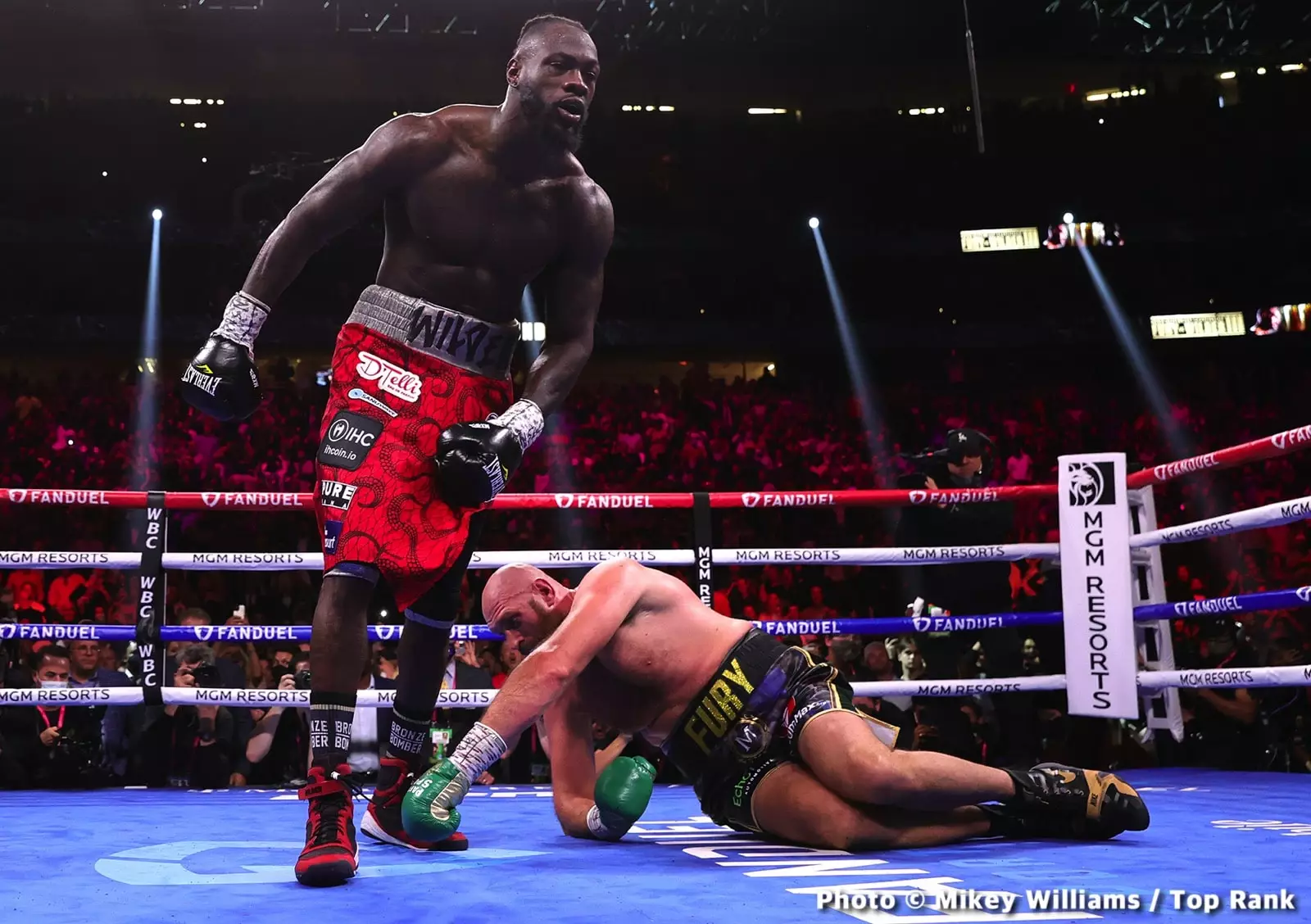BY BOXING HIT STAFF-
Tyson Fury, a name synonymous with heavyweight boxing, is never far from the headlines, particularly as his impending fight with Oleksandr Usyk draws closer. As a two-time heavyweight champion with an impressive resume, Fury’s opinion on who he considers his toughest opponent carries considerable weight. Yet, his choice has raised eyebrows, indicating a more profound narrative beyond just physical prowess.
When asked about who has challenged him the most, Fury’s immediate answer was Deontay Wilder—a statement not particularly shocking given their history. Fury’s encounters with Wilder, including two thrilling victories and a controversial draw, are etched into boxing lore. Wilder’s staggering knockout power is undeniably intimidating, with a reputation for ending fights with a single punch. Fury acknowledged this, saying, “When I fought Wilder he was in his prime, he was the man to beat… terrifying knockouts.”
However, the choice of Wilder over Usyk brings forth an interesting discussion about the nuances of what constitutes a ‘challenging’ opponent. While Wilder’s punching power is alarming, Usyk has demonstrated a blend of technical finesse and tactical acumen that ranks him among the best in the sport. Fury’s victory against Wilder certainly made headlines, but how much did that rivalry define him as a fighter compared to the lessons learned from Usyk? The contrast prompted a broader analysis of what it means to be a formidable opponent in boxing.
Fury’s candidness about his admiration for Wilder’s punching ability indicates his respect for brute strength—a strong parallel to the culture of heavyweight boxing. Fans often romanticize raw power, as it symbolizes the spectacle and excitement inherent in the sport. In the world of heavyweights, the allure of destruction often overshadows the artistry of skillful boxing, and this is where Usyk shines.
To dismiss Usyk’s capabilities based solely on Wilder’s intimidation factor reflects a flaw in the common narratives surrounding combat sports. While Fury’s acknowledgment of Wilder as his toughest challenge may resonate with many, it almost ignores the complex dimensions that define a fighter’s greatness. Fighting Usyk entails navigating not just his punches but a chess match in the ring, which requires heightened intellect and strategy. That’s a battle Fury seems to grapple with mentally.
The psychological interplay between former adversaries often illustrates the intricate mental game of boxing. Fury’s previous encounters with Wilder have etched lessons in his psyche that he openly discusses. Yet, Usyk represents an enigma—one that Fury has struggled to decode effectively. Their first fight illustrated that Usyk possesses the claim to victory by not only defeating Fury but doing so in a manner that highlighted his superior ring IQ and technical skills.
The psychological tactics at play are noteworthy. Fury appears to demonstrate avoidance in fully acknowledging Usyk’s skill set, potentially an internal defense mechanism against the lingering memories of defeat. As the rematch looms, there remains a palpable tension around whether Fury will shift his mindset to respect Usyk’s uniqueness or continue his focus on the explosive nature of past encounters with Wilder.
Furthermore, Fury’s insistence on wrestling with the idea that he can overpower Usyk, as he did with Wilder, raises questions about his strategy heading into the rematch. The consensus tendency to view Usyk merely as another opponent to dominate could lead to underestimation, and Fury should be wary of this pitfall.
As Fury prepares for December 21st, the implications of this rematch might transcend the outcome. A victory over Usyk would serve as a strong testament to his legacy, not just padding it with further accolades but underlining the necessity of overcoming challenges that go beyond power alone. It would undoubtedly fortify Fury’s position in heavyweight history, moving him beyond the shadow of a Wilder rivalry.
The narrative of Fury as a boxer will continue to evolve. His wrestling with opponents who challenge his identity serves as a fascinating subplot within the larger tapestry of his career. However, understanding that boxing is an intricate art form that requires more than formidable strength could present the same kind of revelation Fury discovered in his battles with Wilder. Ultimately, the upcoming fight against Usyk stands as a crucial moment not just for Fury’s legacy, but for the essence of what it means to be a great fighter in boxing’s heavyweight division.


Leave a Reply